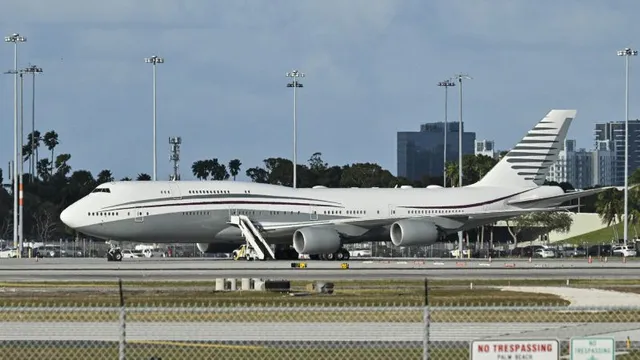
Qatar PM defends luxury jet gift amid bribery accusations
2025-05-21 16:47- Qatari Prime Minister Mohammed bin Abdulrahman Al-Thani defended a $400 million luxury jet gift to President Donald Trump's administration as a transparent transaction.
- The Trump administration confirmed the acceptance of the jet amid allegations from critics who raised concerns about ethics and national security.
- Al-Thani insisted that the accusations of bribery were attempts to tarnish Qatar's reputation and emphasized a longstanding bilateral relationship.
Express your sentiment!
Insights
In Qatar, Prime Minister Mohammed bin Abdulrahman Al-Thani recently addressed allegations surrounding a $400 million luxury jet gift to the Trump administration. During an interview at the Qatar Economic Forum, he characterized the transaction as a legitimate and transparent exchange between allies. Al-Thani asserted that Qatar's long-standing relationship with the United States has been institutional, spanning multiple administrations, and emphasized that the proposed gift is a straightforward Ministry of Defense to Department of Defense transaction, notably amidst growing scrutiny due to accusations of it being a means to buy influence. The discussions surrounding the jet, a Boeing 747-8, gained momentum when the Trump administration expressed interest in acquiring a replacement for the aging Air Force One. Trump openly acknowledged the gift as a significant contribution and rebuffed critics who labeled the transaction as corrupt. He highlighted that accepting the jet would be a foolish decision if it aligned with governmental needs, asserting that it was intended for U.S. defense purposes rather than personal use. Moreover, Trump mentioned that he planned to donate the aircraft to his presidential library after finishing his term, asserting the gift's transparency. Despite ongoing debates in Congress concerning ethical implications and adherence to the Foreign Emoluments Clause, which restricts the President from accepting gifts from foreign states without Congressional consent, Trump characterized the value of such a gift as beneficial. Defense Secretary Pete Hegseth confirmed that they would ensure the aircraft meets security requirements during its proposed modifications for presidential use. Amidst the ongoing controversy, Al-Thani has firmly denied any intent to undermine U.S. governance through the gift. The transaction is perceived as an extension of Qatari contributions, including previous assistance during U.S. evacuations from Afghanistan and security deployments during major events in Qatar. However, several lawmakers expressed concerns, questioning whether the acceptance of such a luxury item poses risks for political integrity and national security. The scrutiny of the transaction illustrates the ongoing tensions regarding foreign relations, ethics in government, and the institutional mechanisms in place to safeguard against potential conflicts of interest.
Contexts
The history of Qatar-US relations has evolved significantly over the past several decades, marked by strategic partnerships, economic cooperation, and mutual interests in regional stability. Diplomatic ties between the two nations were officially established in 1972, and since then, the relationship has strengthened, particularly following the Gulf War in the early 1990s. Qatar's strategic location in the Persian Gulf has made it a vital ally for the United States, especially in military and counter-terrorism operations. The establishment of the Al Udeid Air Base in 2003 cemented this alliance, providing the US military with a critical hub for operations in the Middle East, which has enabled effective responses to various regional threats and conflicts, notably in Iraq and Afghanistan. Economic relations between Qatar and the US have also flourished, particularly in the energy sector. Qatar is one of the largest producers of liquefied natural gas (LNG) globally, and it has developed robust ties with American energy companies that invest in its infrastructure and technology. The US exports a variety of goods to Qatar, including machinery and transportation equipment, further bolstering economic interdependence. This partnership has not only contributed to the prosperity of both nations but has also played a significant role in stabilizing the broader region, as energy security is a key concern for the US and its allies. In recent years, the relationship has diversified beyond military and economic ties to include cooperation in education, cultural exchanges, and combating terrorism. Initiatives like the Qatar-US 2021 Strategic Dialogue have highlighted collaborative efforts in areas such as education, health, and technology, showcasing a commitment to building long-term partnerships. Moreover, both nations have worked together to address regional challenges, including the ongoing crises in Syria and Yemen, as well as efforts to promote a peaceful resolution to the Israeli-Palestinian conflict. The US has recognized Qatar's role as a mediator and a key player in regional diplomacy, particularly in engaging with the Taliban during peace negotiations. Despite the strengths of their relationship, challenges remain, particularly regarding differing perspectives on regional conflicts and issues surrounding human rights. The US has occasionally expressed concerns about Qatar's support for certain groups in the region, which necessitates continued dialogue and mutual understanding. However, both nations share a vested interest in maintaining stability in the Gulf, combating terrorism, and fostering economic growth. As geopolitical dynamics evolve, the future of Qatar-US relations will likely continue to adapt, underscoring the importance of collaboration and strategic alignment in addressing the complex landscape of Middle Eastern politics.